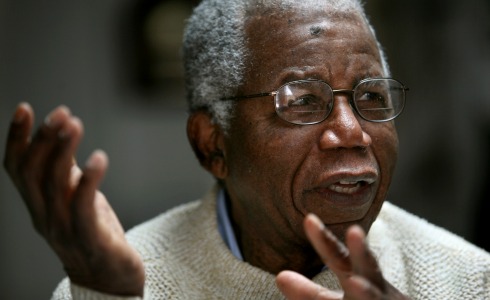 Nigerian-born novelist and poet Chinua Achebe. (AP Photo/Craig Ruttle, File)
Nigerian-born novelist and poet Chinua Achebe. (AP Photo/Craig Ruttle, File)
NEW YORK — The opening sentence was as simple, declarative and revolutionary as a line out of Hemingway:
“Okonkwo was well known throughout the nine villages and even beyond,” Chinua Achebe wrote in “Things Fall Apart.”
Africans, the Nigerian author announced more than 50 years ago, had their own history, their own celebrities and reputations.
Achebe, the internationally celebrated Nigerian author, statesman and dissident, who died at age 82 after a brief illness, continued for decades to rewrite and reclaim the history of his native country. Achebe lived through and helped define revolutionary change in Nigeria, from independence to dictatorship to the disastrous war between Nigeria and the breakaway country of Biafra in the late 1960s.
He knew both the prestige of serving on government commissions and the fear of being declared an enemy of the state. He spent much of his adult life in the United States, but never stopped calling for democracy in Nigeria or resisting literary honors from a government he refused to accept.
Even in traffic today in Lagos, Nigeria’s largest city, hawkers sell pirated copies of his recent civil war memoir.
“What has consistently escaped most Nigerians in this entire travesty is the fact that mediocrity destroys the very fabric of a country as surely as a war — ushering in all sorts of banality, ineptitude, corruption and debauchery,” wrote Achebe, whose death was confirmed Friday by his literary agent, Andrew Wylie.
His public life began in his mid-20s. He was a resident of London when he completed his handwritten manuscript for “Things Fall Apart,” a short novel about a Nigerian tribesman’s downfall at the hands of British colonialists.
Turned down by several publishers, the book was finally accepted by Heinemann and released in 1958 with a first printing of 2,000. Its initial review in The New York Times ran less than 500 words, but the novel soon became among the most important books of the 20th century, a universally acknowledged starting point for postcolonial, indigenous African fiction, the prophetic union of British letters and African oral culture.
“It would be impossible to say how ‘Things Fall Apart’ influenced African writing,” the African scholar Kwame Anthony Appiah once observed. “It would be like asking how Shakespeare influenced English writers or Pushkin influenced Russians. Achebe didn’t only play the game, he invented it.”
“Things Fall Apart” has sold more than 8 million copies worldwide and has been translated into more than 50 languages. Achebe also was a forceful critic of Western literature about Africa, especially Joseph Conrad’s “Heart of Darkness,” standard reading for millions, but in Achebe’s opinion, a defining example of how even a great Western mind could reduce a foreign civilization to barbarism and menace.
“Now, I grew up among very eloquent elders. In the village, or even in the church, which my father made sure we attended, there were eloquent speakers. So if you reduce that eloquence which I encountered to eight words … it’s going to be very different,” Achebe told The Associated Press in 2008. “You know that it’s going to be a battle to turn it around, to say to people, ‘That’s not the way my people respond in this situation, by unintelligible grunts, and so on; they would speak.’ And it is that speech that I knew I wanted to be written down.”
Achebe never did win the Nobel Prize, which many believed he deserved, but in 2007 he did receive the Man Booker International Prize, a $120,000 honor for lifetime achievement. Achebe, paralyzed from the waist down since a 1990 auto accident, lived for years in a cottage built for him on the campus of Bard College, a leading liberal arts school north of New York City where he was a faculty member. He joined Brown University in 2009 as a professor of languages and literature.
Achebe, a native of Ogidi, Nigeria, regarded his life as a bartering between conflicting cultures. He spoke of the “two types of music” running through his mind— Ibo legends and the prose of Dickens. He was also exposed to different faiths. His father worked in a local missionary and was among the first in their village to convert to Christianity. In Achebe’s memoir “There Was a Country,” he wrote that his “whole artistic career was probably sparked by this tension between the Christian religion” of his parents and the “retreating, older religion” of his ancestors. He would observe the conflicts between his father and great uncle and ponder “the essence, the meaning, the worldview of both religions.”
Besides his own writing, Achebe served for years as editor of Heinemann’s “African Writer Series,” which published works by Nadine Gordimer, Stephen Biko and others. He also edited numerous anthologies of African stories, poems and essays. In “There Was a Country,” he considered the role of the modern African writer.